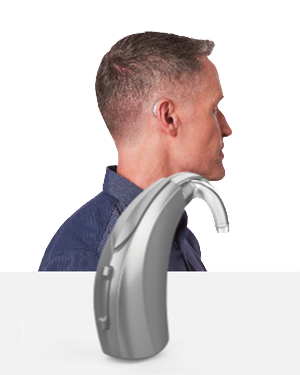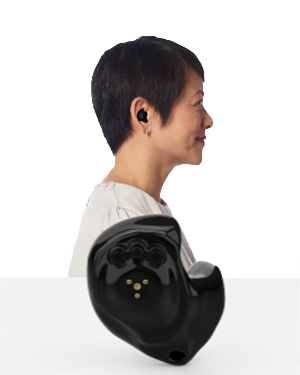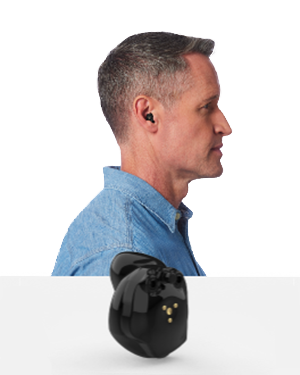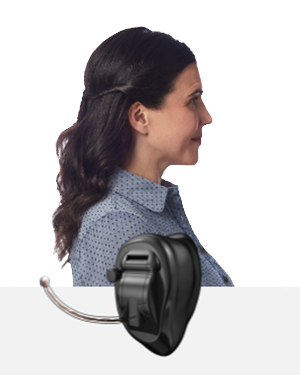
Hearing aids are powerful tools for improving daily communication and quality of life. However, like any electronic device, they aren’t indestructible, and certain factors can influence their performance and lifespan. Understanding these factors is essential to maximize the longevity of your hearing aids and ensure optimal hearing health for years to come.
In this guide, we explore the factors that impact how long hearing aids last and provide expert tips on maximizing their lifespan.
The Average Lifespan of Hearing Aids
On average, prescription hearing aids have a lifespan of 3 to 7 years. However, this range can vary based on several factors, including the type and style of aids you have:
Behind-the-Ear (BTE) Hearing Aids

Behind-the-ear hearing aid styles have an average lifespan of 5 to 7 years. BTE aids have a durable plastic casing that sits behind the ear and houses all the delicate electronic components. Attached to the casing is a tube or wire with a soft tip, or a custom ear mold that fits comfortably in the ear canal.
In-the-Ear (ITE) Hearing Aids

ITE hearing aids are custom-molded to the unique contours of the outer ear and have an average lifespan of 3 to 5 years.
In-the-Canal (ITC) Hearing Aids

ITC hearing aids are custom-molded to the outer ear and ear canal and have an average lifespan of up to 3 years.
Completely-in-the-Canal (CIC) Hearing Aids

CIC hearing aids are custom-molded to fit completely inside the ear canal and have an average lifespan of up to 3 years.
Factors that Can Affect How Long Hearing Aids Last
From manufacturing quality to cleaning and maintenance, many factors can affect how long hearing aids last. Understanding these factors can help you take steps to prolong the lifespan of your devices and maintain optimal performance. Below, we explore some factors that can influence the lifespan of your hearing aids.
Manufacturing Quality
The quality of the materials and craftsmanship used in the manufacturing of hearing aids can greatly affect how long they last. Higher-quality prescription hearing devices from reputable brands are built with highly durable components that can withstand years of daily use.
On the other hand, lower-cost hearing aids may not be as durable, leading to a higher likelihood of repairs or early replacement. When purchasing hearing aids, it’s essential to choose a brand and model known for quality to ensure long-lasting performance and the personalized hearing loss care you deserve.
Exposure to Moisture and Dust
Moisture and dust are two of the most common threats to the longevity of hearing aids. Over time, exposure to moisture like humidity or sweat can cause internal corrosion and damage electronic components in hearing aids. Dust can clog microphones and speakers, leading to reduced sound quality and even malfunctions.
To protect your hearing aids from moisture and dust damage, it’s important to clean them every day and use a hearing aid dehumidifier at night. Waterproof hearing aids are also a great option, especially if you live in a particularly dusty, humid, or rainy area.
Lifestyle and Environmental Factors
General wear and tear is inevitable for any electronic device that you use every day, and hearing aids are no exception. However, factors like harsh weather, sweat and/or body oils, and cosmetic damage can all impact the lifespan of hearing devices.
If you lead an active lifestyle or frequently engage in physical exercise or outdoor activities, these conditions can cause faster deterioration of hearing aid components. Exposure to harsh conditions, such as high temperatures or humidity, as well as incidents of being dropped or scratched can also significantly reduce their durability.
Protecting your hearing aids by handling them carefully, cleaning and storing them properly, and being thoughtful about environmental factors can minimize damage and increase longevity.
Cleaning and Maintenance Routine
Hearing aids are built for daily use, and most prescription models are durable enough to handle everyday wear and tear with ease. However, poor cleaning and maintenance can reduce their effectiveness and shorten their lifespan considerably.
Cleaning your devices every day, storing them in a cool, dry place, and using a hearing aid dehumidifier to protect against moisture can significantly increase their longevity. Regular maintenance, including professional cleanings and adjustments every three to six months, is also essential.
How to Extend the Lifespan of Your Hearing Aids
Proper care can significantly extend the lifespan of your hearing aids. By adopting good habits and following your specialist’s recommendations, you can prolong the longevity and performance of your hearing devices for years.
Here are some practical tips to help you maximize the lifespan of your hearing aids and get the most out of them:
Clean Them Regularly
Your hearing aids need to be cleaned every day to keep them functioning properly. An improper cleaning routine can result in an excess buildup of earwax, moisture, or other harmful debris, all of which can compromise performance or lead to serious damage.
Clean your hearing devices every night using a soft, dry cloth to wipe down the exterior. Carefully remove earwax and debris from the microphone, speaker openings, and tubing (if applicable) using a specialized brush or tool.
Speak with your hearing specialist about the proper daily cleaning steps required for your specific hearing aids.
Use a Hearing Aid Dehumidifier
Using a hearing aid dehumidifier every night is essential to remove moisture that accumulates from sweat, humidity, or other environmental factors. If your device uses removable batteries, take them out and leave the compartment open while the hearing aid dries.
Store them Properly
Proper storage is key to keeping your hearing aids safe when not in use. To prevent physical damage from drops or dust accumulation, always store them in a protective case. High temperatures and/or humidity can degrade the performance and materials of your hearing aids, so always keep them in a cool, dry place.
Avoid leaving them in bathrooms, vehicles, or any other places where they may be exposed to heat or moisture.
Schedule Professional Checkups Regularly
Even with diligent daily care, it’s important to have your hearing aids professionally checked on a regular basis. Your hearing healthcare specialist can perform thorough deep cleanings, check for any internal issues, and make necessary adjustments to ensure they are working as efficiently as possible.
Regular checkups also allow professionals to spot any potential problems early, preventing major issues down the line. This is essential for ensuring long-term hearing health and maximum hearing aid performance for years to come.
Audibel Hearing Clinics Now Service All Hearing Aid Brands
Hearing aids are an invaluable investment in your auditory health and overall well-being. With proper care and maintenance, you can maximize the lifespan of your hearing devices and the effectiveness of your hearing loss care.
At Audibel, we are proud to offer new patient maintenance services on all hearing aid brands no matter where you bought them from. Whether you’re visiting us for the first time, or you are due for a checkup, our hearing healthcare specialists are here to offer the personalized care you deserve. Don’t wait—find an Audibel hearing clinic near you today.






Have a question or Comment?